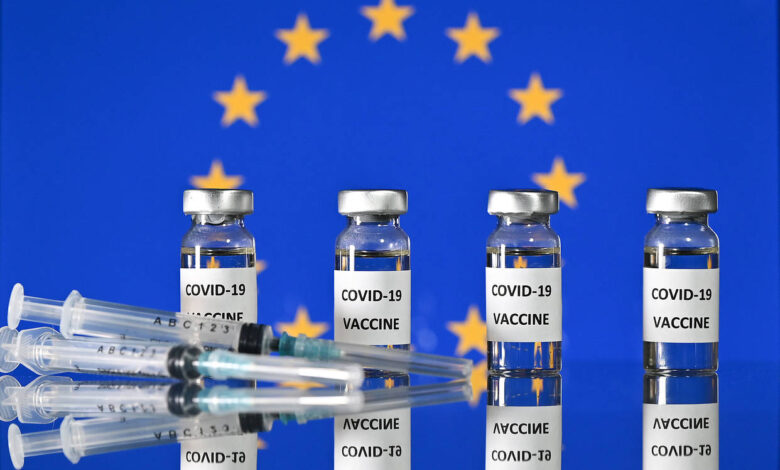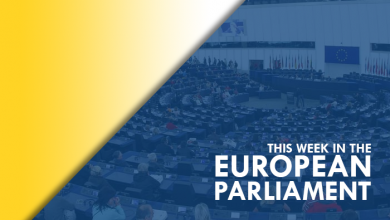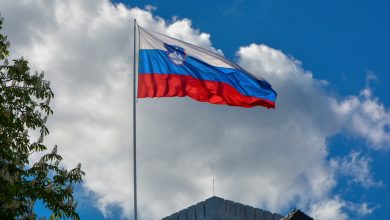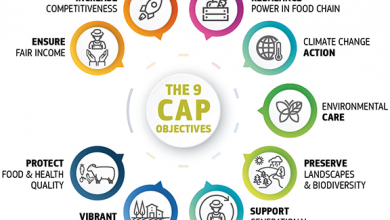Stop Blaming The EU Over The Slow Vaccine Rollout

A narrative is emerging about vaccinations against Covid-19, which sees the European Union as a slow, slumbering giant too slow to negotiate contracts with pharmaceutical companies. This is placed in contrast with a supposed Anglo-American vaccination success. There is of course an element of truth to this narrative, as both countries are far ahead of the EU in vaccine jabs relative to their population, but it’s also misleading. A critical piece of the story is left out of the picture.
Vaccine Nationalism And Political Myopia
Let’s start with the fundamentals. The EU’s negotiating wasn’t slow, nor was it inefficient. In fact, the EU – AstraZeneca purchasing agreement precedes the company’s similar deal with the United Kingdom. The “British first” clause did not stem out of a commercial contract. It was the result of public funds made available to Oxford, which AstraZeneca gained access to once the two teamed up to develop a vaccine.
Deploying early funding to support a vaccine for the new coronavirus is undoubtedly a sensible move. Vaccine nationalism, conversely, was extremely myopic. The funding being made conditional on Britain receiving doses before anybody else might seem like a nation-state ruthlessly pursuing its interests while leaving the rest of the world out to dry, and to a degree this is true. But even if one handwaves this selfishness as acceptable, the fundamental point is missing: this logic makes it harder, not easier, to fight the pandemic.
Every new generation of the virus increases the likelihood that it will mutate. The more people are infected all over the world, the likelier it is that the virus will change. The more the virus changes, the less effective vaccines will be. Should the UK manage to vaccinate its entire population, and open up to the rest of the world, it would be confronted with a situation in which contagions still surge in the majority of the planet, leading to more and more variants, and presenting the spectre of a new wave in the UK itself, endangering all the work done so far. Only a global rollout of vaccines can properly stem the tide of the pandemic.

The World “First”, Europe “Second”
This is not fringe epidemiology. This fact was well understood as far back as January 2020. For all the uncertainty surrounding the new coronavirus, it was still a coronavirus – many in this clade are already known to science, and while there could be no certainty as to how fast the virus would mutate, it was fair to assume it would eventually produce variants, especially if confronted with piecemeal vaccinations. This is why, when Germany funded BioNTech like the UK did Oxford, the government in Berlin did not include a “Europe first” clause. Nor did the European Commission see it fit to intervene and request one. This attitude remained consistent when BioNTech partnered with American pharmaceutical company Pfizer. Meanwhile, the UK vetoed a partnership between Oxford and American company Merck, forcing a partnership with British AstraZeneca instead.
And yet, while the EU was making sound medical R&D decisions, and trusting its long-standing partners to do the same, worrying signs started coming out of the Atlantic. Then-president Trump tried to steal BioNTech from Germany to gain exclusive American access to the vaccine. The move failed, and even so, back then it caused an uproar. Why the same indignation is not on display now, with countries monopolising vaccine doses, is a great mystery of public opinion.
Export Bans And The Global Vaccine Supply Chain
Trump didn’t seem overly concerned with his failure to steal the BioNTech vaccine. Indeed, he didn’t even bother to sign Pfizer supply contracts. This is because he knew that most of the new partnership’s production capacity was in the United States; he only needed a legal excuse to seize doses present on American soil, or block them with an export ban, and he would get all the jabs his country would need. The absurdity of this beggar-thy-neighbour policy is that European vaccines are being used, not only in Europe, Japan, and South Korea, but also Mexico and Canada – the two countries bordering the Continental United States, who have no other option given their neighbour’s export ban on vaccines.
The legal cover for this – which the Biden administration is still using at time of writing – is twofold: one is Trump’s December 2020 executive order, giving Americans first priority to vaccines produced on American soil. The other, more substantial basis is the Defense Production Act.

We’re not discussing a trickle here, either: millions of EU doses have been used in the aforementioned countries, as well as in developing countries, while the United States and the United Kingdom simply seize EU doses produced on their soil and regularly purchased well in advance. This unilateral seizing is nothing short of vaccine piracy, and as mentioned, it’s making it all the harder to have a meaningful global impact on the pandemic. Should dangerous variants proliferate, it might even backfire, causing untold damage to the economy, as well as – and more seriously – additional loss of life. The United States alone has got its hands on over five million EU vaccine doses.
EU-UK Relations Take Centre-Stage
On the other side of the coin is the UK’s own vaccine piracy – primarily fueled by what the EU deems AstraZeneca’s breach of contract. Already on 29th January, AstraZeneca informed the EU that it would be unable to meet promised shipments due to “production problems” in its two European plants. This was because doses slated for the EU had been delivered to the UK instead. Brussels demanded AstraZeneca uphold its contract, which obliged it to make use of all four of its production facilities (two in the UK, two in the EU) to meet its obligations on deliveries. Shielded by the “British first” clause, AstraZeneca refused to bridge the gap with exports from the UK. The stage was set for a cross-channel battle of wills that is not yet concluded at time of writing.
Up to January 2021, the EU had included the UK in all of its anti-pandemic industrial coordination plans, making sure Britain was not isolated from the world economy on critical items such as ventilators and medical equipment during the first and second surges of covid cases. This has included as many as ten million vaccine doses exported from the EU to the UK. Britain’s current manipulation of vaccine exports has ended that cooperation. The Commission has retaliated and is moving ahead with its own export ban, and it is likely that additional countermeasures will be forthcoming. As more vaccines enter the market, AstraZeneca’s leverage will diminish. Legally, the battle might well last for years to come. Politically, the tide has already turned against them.

The Strategic And Political Bankruptcy Of European Member States
A final consideration should be made to close out this much-needed reframing of the vaccine narrative. It would be easy to draw the conclusion that the EU was naive to trust in its international partners to put collective long-term interests ahead of their own short-term benefit. This misses the fundamental point on two levels. First is the already explored medical argument: a piecemeal rollout of vaccines in select countries is an own goal, as the virus rages everywhere and the number of mutations increase. The failure to coordinate vaccine distribution on an international scale ultimately represents the failure of humanity to address this crisis effectively; it will lengthen it, not shorten it.
A narrower but equally important point is that the EU did not act naively – rather, it acted as it has always been intended to act, by design. It is completely unreasonable to expect the EU to act and think like a hard power, neorealist security institution, when Member States still jealously guard their monopoly on security and national defence. As we have emphatically argued before, Member States are in the driver seat when it comes to running the Union through the pandemic, and they’re making a terrible job of it.
The Catch 22 Vaccine Scenario
Healthcare is also a competence lying primarily with the Member States. Their refusal to equip the EU with the proper tools to handle security responsibilities has left this flank open to Anglo-American vaccine piracy. It is their political timidity which leads them to preserve this institutional status quo even in the face of a world-changing crisis. In addition, their pathological concerns with short-term gains over long-term strategy is what motivates them to use the EU as a scapegoat for everything they fail to accomplish.
Unfortunately, this is the “Catch 22” European institutions are constantly exposed to. Had the European Commission truly tried to force BioNTech to end its partnership with Pfizer and find a European partner instead, Member States today might be playing the blame game the other way, pointing to the failed partnership as the reason for the delayed availability and rollout of anti-covid jabs. This crisis has made it obvious that 19th-Century European nation states are not fit to govern themselves in a crisis.
If you want evidence of the need for true European integration, look no further than the vaccine rollout crisis. This is more than recrimination about the past – it contains a concern about the future. The end of the pandemic is not yet in sight. Even as immunisations mount, the process to make the virus both endemic and harmless will be long and arduous. Will Europe get through to the end of this great challenge still in one piece? How exactly do European Member States plan to survive climate change when the coronavirus has so thoroughly outmatched them? These remain, at the moment, tragically open questions.






WOW, the mental gymnastics required here to maintain your view of EU good all others bad must be quite embarrsing for a scribe of your intelligence, the effort to draw like for like comparision with investment in a charitable not for profit eductational institution and one in a ongoing co-operate concern is at best tortuous. If UK GSK had developed a vaccine there would be no UK preferentail clause, just as if Berlin U had ground breaking research there would be at the very least an ownership in the rights for those who invested in the developement. The question the EU should be asking is why no University in 27 countries even had a vaccine in developemnt?
Nobel Prize winner and Stanford professor P. Krugman in the NYTimes identified the root-cause of the EU’s vaccination debacle: “Europe’s vaccination debacle will almost surely end up causing thousands of unnecessary deaths. And the thing is, the continent’s policy bungles don’t look like isolated instances, a few bad decisions made by a few bad leaders. Instead, the failures seem to reflect fundamental flaws in the continent’s institutions and attitudes […]”
As to AstraZeneca, Politico provided a sound analysis of why the UK negotiated much better a contract than the EU. (“How the UK gained an edge with AstraZeneca’s vaccine commitments”) For instance, the article details the UK already in May signed an earlier agreement with AstraZeneca.
MEP and EP Budget Commitee Chair J. Van Overtveldt summarised the European Commission’s negotiation boldly: “It’s hard to define the 42 pages as a contract. This is more a declaration of good intentions.” (https://sciencebusiness.net/news/eus-lead-covid-19-vaccines-negotiator-defends-contracts?fbclid=IwAR2nUvkv3mP5yXA8ZRa–skZY8E49CGAp19wWF-2lHnZtoUdwuSs7YHV9c0) The Chairman also analysed the EU Commission’s failing: “Somewhere down the timeline, the European Commission must have realised things had run out of hand. To distract the attention, the Commission picked up a public fight with the vaccine manufacturers, one in particular.” (https://www.knack.be/nieuws/belgie/vaccinatiestrategie-europese-commissie-heeft-verwachtingen-gecreeerd-die-ze-niet-heeft-kunnen-inlossen/article-opinion-1715503.html)
Of course, none of these inconvenient facts are likely to resonate in this echo chambre.